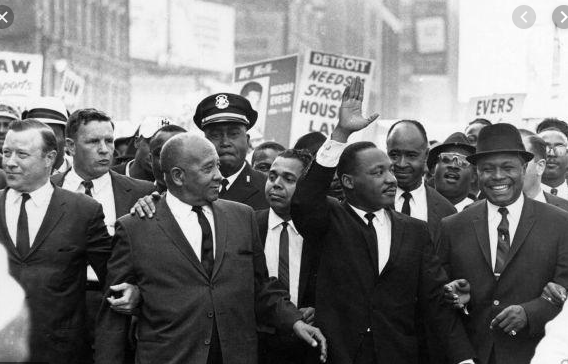On June 23, 1963 Martin Luther King Jr. stood in Detroit and spoke about a dream. It was a fraught moment in the history of the American civil rights movement. Noted civil rights activist Medger Evers had been murdered by a white supremacist just days earlier.
We talked to Detroit historian Ken Coleman, author of On This Day: African-American Life in Detroit and writer for Michigan Advance, about MLK Jr.’s visit to the city.
The speech in Detroit took place two months before the famous March on Washington and was a part of the Walk for Freedom March. It was organized by the Detroit Council for Human Rights, a recently-formed civil rights organization in the city.
King was joined by civil rights and political leaders, including Reverend C.L. Franklin and Detroit Mayor Jerome Cavanagh. The march followed a path down Woodward Avenue, and more than 125,000 people attended. Notably missing from the effort was the Detroit chapter of the NAACP. At the time, Coleman said, the NAACP was more conservative than other groups involved in the civil rights movement.
Dr. King’s speech demanded the government and society respect African Americans and immediately advance federal civil rights legislation.
“And so we must say, now is the time to make real the promises of democracy. Now is the time to transform this pending national elegy into a creative psalm of brotherhood. Now is the time to lift our nation. Now is the time to lift our nation from the quicksands of racial injustice to the solid rock of racial justice. Now is the time to get rid of segregation and discrimination. Now is the time.”
King also brought up societal inequities in employment in his speech. According to Coleman, this issue was particularly pertinent in Detroit where African Americans were underrepresented in city jobs, despite making up 35 to 40% of the population.
“African Americans made up less than 5% of the sworn police officers of Detroit, and that was a real issue, particularly when it came down to police – community relations,” explained Coleman. “[There was] a feeling in the black community that far too many times, African Americans were harassed by police officers.”
King’s speech in Detroit was the “forerunner for the march on Washington” according to Colemen. The speech ends with the familiar block of “I have a dream” statements. In it, King speaks specifically his dream for black people in Detroit to “be able to buy a house or rent a house anywhere that their money will carry them, and they will be able to get a job.”
Like the iconic Washington speech, King’s Detroit speech ends with a line from an old hymn:
“Free at last, free at last. Thank God Almighty, we are free at last.”
For article, click below:
Source: The legacy of Martin Luther King Jr.’s 1963 visit to Detroit | Michigan Radio


